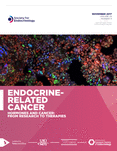Thyroid dysfunction and tyrosine kinase inhibitors in renal cell carcinoma
- Oncology Unit - ICOT, Department of Medico-Surgical Sciences and Biotechnologies, University of Rome ‘Sapienza’, Latina, Italy
1Department of Gynecology and Urology, University of Rome ‘Sapienza’, Rome, Italy
- Correspondence should be addressed to A Papa; Email: anselmo.papa{at}libero.it
Abstract
The most recent World Health Organization classification of renal neoplasms encompassed nearly 50 distinctive renal neoplasms. Different histological subtypes have different clinical outcomes and show different responses to therapy. Overall, the incidence of kidney cancer has increased worldwide in the last years. Although the most common type of kidney cancer is localized renal cell carcinoma (RCC), with a 5-year survival rate of 85%, about one third of patients present advanced or metastatic disease at diagnosis, with a 5-year survival rate of only 10%. Multi-targeted receptor tyrosine kinase inhibitors (TKIs, sunitinib and sorafenib), the anti-VEGF MAB bevacizumab in association with interferon-α, and the mTOR inhibitors are now approved for the treatment of mRCC. Recently, the novel agents pazopanib and axitinib have also demonstrated efficacy in mRCC patients. Several recent retrospective and prospective trials have suggested that some of their adverse events, such as hypertension, hypothyroidism, and hand foot syndrome (HFS) may act as potential biomarkers of response and efficacy of treatment. In this review, we analyzed the studies that have suggested a relationship between hypothyroidism onset and a better outcome of mRCC patients treated with TKIs. The biological mechanisms suggesting and explaining this correlation are not well known and different speculative theories have been considered in order to investigate the clinical link between hypothyroidism occurrence and the prolonged therapy with TKIs in solid tumors. Furthermore, the management of this unexplained side effect is very important to maximize the efficacy of therapy in mRCC patients because there is a clear and consistent relationship between drug dose and efficacy of treatment. Certainly, other studies are needed to clarify whether a better outcome is associated with hypothyroidism induced to TKIs in patients with mRCC.
- Revision received 3 July 2013
- Accepted 5 July 2013
- Made available online as an Accepted Preprint 5 July 2013
- © 2013 Society for Endocrinology












